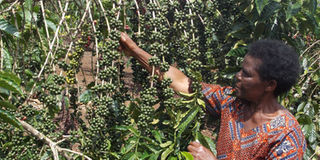Ssemwezi now depends entirely on mixed farming

Ms Ssemwezi attends to her coffee crop. Photo by Michael J Ssali
What you need to know:
- SUMMARY: Her passion for farming, is evident despite the challenges. It has been a long journey for Elizabeth Nanziri Ssemwezi who started from zero after losing her fuel business, writes Michael J Ssali.
Elizabeth Nanziri Ssemwezi lived in Kampala for several years working with her husband at their family petrol station business. They also had a home in Bukoto, Kabonera Sub-county, Masaka District, where the couple would sometimes go for holidays.
It is in this home that she now lives as a farmer, following her husband’s sudden death in 2002 and the subsequent closure of their fuel selling business in Kampala.
Starting
“Shortly before his death, I had pointed out to him that I preferred to live here and try coffee farming. I was looking at coffee as my main farming project because my parents were coffee farmers,” she told Seeds of Gold.
“He agreed to my idea but I could see that he was rather skeptical about my capacity to succeed as a farmer. Unfortunately he did not live long enough to see how far I have come in achieving that dream.”
Francis Ggaanya, a coffee farmer and officer in Buganda Kingdom’s Mwanyi Terimba project describes Ssemwezi as the best female coffee farmer in the entire sub-county.
“She is one of the farmers we persuaded to take up cloned Robusta coffee growing. And I am glad I was there to assist her when she was starting out,” Ggaanya says.
Coffee
Ssemwezi recognises Ggaanya’s effort in helping her start her coffee farming business and going all the way in guiding her on where to find the right nursery to purchase the initial 960 Robusta coffee clones for planting.
“We purchased the clones from a coffee nursery in Mpigi District and I hired his pick-up truck to bring them over. He advised me to plant the clones at the spacing of ten feet by 10 feet and he would occasionally come to see how the coffee was doing and give further guidance.”
After about two years she went for more 650 Robusta coffee clones and later she purchased another 530 clones. Today she has about five acres of cloned Robusta coffee.
Philip Muluya, Chairman of Kabonera Coffee Farmers Cooperative Society, described Ssemwezi as a very hardworking and quality focused coffee farmer. “She is well known for her good quality coffee, carefully harvested, and very well dried,” he told Seeds of Gold.
“We insist that our farmers pick only red ripe coffee, dry it on clean tarpaulin, and ensure it is thoroughly dry. This is exactly what that woman does. We value her product.”
Advice to farmers
“Women should stop underrating themselves,” Ssemwezi says. “They should stop thinking that coffee is a man’s crop. We too can grow coffee and earn money out of it. The good thing about growing coffee on a fairly large scale, like five of more acres is that the farmer gets a lumpsum of money, at ago.”
For reasons of personal security she was not willing to disclose how much money she earns from her coffee sales. She said whenever she takes her coffee for sale at Kabonera Coffee Farmers Cooperative Society she instructs the manager to deposit her money on her bank account.
She, however, revealed that she earns enough money to meet most of her needs including fuelling and keeping her car in good condition. She has also helped many of her children and relatives with school fees.
She said she finds it rewarding being part of Kabonera Coffee Farmers Cooperative Society. “As members we are given inputs such as fertilisers or herbicides on credit and we pay after the coffee harvest. We are also members of a bigger coffee farmers’ organisation, NUCAFE, (National Union of Coffee Agri-business and Farm Enterprises) which directly exports our coffee overseas and enables us to earn higher revenue from the crop.”
Diversify
Over the years she has diversified her farming activities to include pig rearing, a two-acre-banana garden, and two cross Friesian cows under zero grazing. She uses livestock droppings as manure for her banana garden.
To maximize profits from cattle and pig keeping she grows her own livestock feeds in form of maize and sweet potato vines.
Her banana garden is lined with a wide strip of sweet potato mainly bred to provide vines.
These are used as feed for her pigs and cows which also feed on grass and maize bran.
After harvesting the maize, the left-over stamps are used for mulching her banana garden. The cows produce between 15 and 20 litres a day.
She did not say how many pigs she keeps on her farm but disclosed that she sells her piglets at about Shs100,000 each.
Best practices
A visit to Elizabeth Nanziri Ssemwezi’s coffee plantation revealed that she is also very keen on weed control. There were hardly any weeds and there were deep gullies to trap running water. Most coffee tree branches were bent, heavily laden with green coffee cherries.
“Fighting weeds is one of my biggest challenges. I either hire prisoners to remove weeds manually with hoes or I hire someone to spray herbicides over them. I then apply inorganic fertiliser to give vigour to the coffee trees.”
She disclosed that inorganic fertilisers have also proven effective in boosting her Cavendish (bogoya) banana production. Part of her coffee plantation is intercropped with bogoya and she sells the bananas every now and again.




